仁爱英语八年级上册导学案:Unit1 Playing Sports(无答案)
- 格式:doc
- 大小:93.50 KB
- 文档页数:11
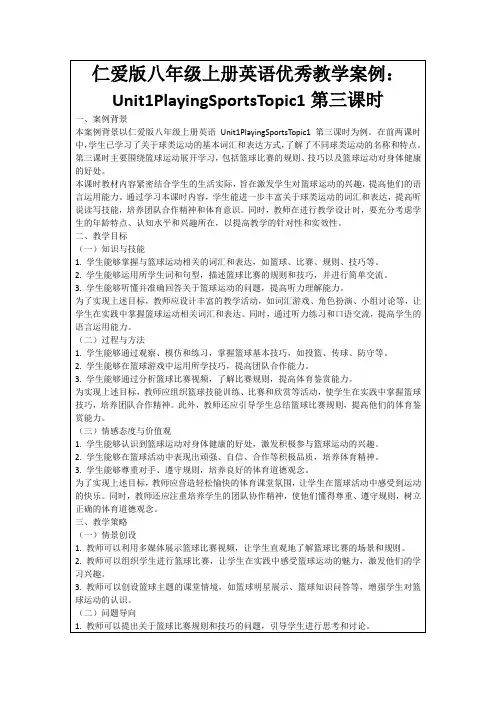
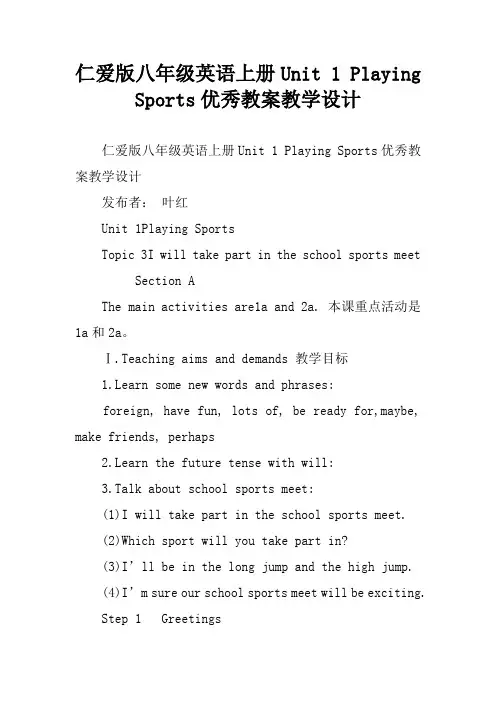
仁爱版八年级英语上册Unit 1 Playing Sports优秀教案教学设计仁爱版八年级英语上册Unit 1 Playing Sports优秀教案教学设计发布者:叶红Unit 1Playing SportsTopic 3I will take part in the school sports meet Section AThe main activities are1a and 2a. 本课重点活动是1a和2a。
Ⅰ.Teaching aims and demands 教学目标1.Learn some new words and phrases:foreign, have fun, lots of, be ready for,maybe, make friends, perhaps2.Learn the future tense with will:3.Talk about school sports meet:(1)I will take part in the school sports meet.(2)Which sport will you take part in?(3)I’ll be in the long jump and the high jump.(4)I’m sure our school sports meet will be exciting.Step 1 Greetings(Greet students and come to talk about sport.)T: Good morning. Everyone, how are you today?Ss: I’m fine. Thank you.T: What did you do during your weekend? Did you do some sport?Ss: Yes.T: What sport do you like? Which sport do you like best?Step 2 Presentation2.(1) (Show some pictures of sport and teach some new words about sports)T: The school sport meet is coming. Do you want to take part in it?Ss: Yes.T: I am very glad to hear that. Now look at these pictures . Tell me what sport is it.( lead to some new words about sport.)100-meter race, relay race, basketball, the high jump, the long jump…(2) Come to the future tence “will” sentence pattern .T: There are so many sports in the school sportmeet.will you take part in the sport meet?Ss: Yes .T: Which sport will you take part in ?Ss: I will take part in…I will be in…….(3) PracticePair work Try it with your partner and use the following sentences.A: Will you take part in the school sport meet?B: Yes , I will.A: Which sport will you take part in?B: I will take part in …A: How about you?B: I will bein …A: Why?B: Because I am good at …I enjoy…(Explain theusage of “will” and tell students that “ take part in = be in”.Step 3 Learn 1a and 2a1. T: Look at this picture. Yu Ting and Li Ming aretalking about the school sport meet onthe playground. Do you want to know what are they talking about?Ss: Yes.T: OK. Let’s listen .This is a dialog between Li Ming and Yu Ting. Listen to the dialog carefully and check the information.. Please turn to P17.(Do listening and listen again to check the answers) Read 1a together and act it out.3. Practice“ I am a reporter”Interview some of your classmates what they will do in the school sport meet.4.Learn 2a.T: I am very glad you can do so many things in the sport meet. Are you ready for it?( be ready for 为。
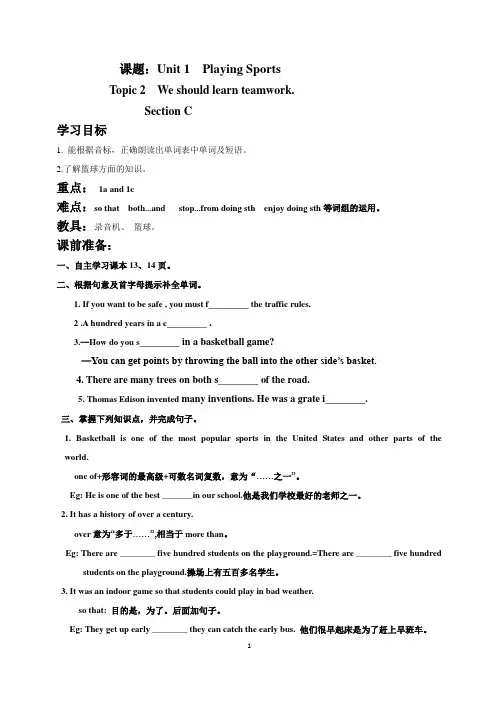
课题:Unit 1 Playing SportsTopic 2 We should learn teamwork.Section C学习目标1. 能根据音标,正确朗读出单词表中单词及短语。
2.了解篮球方面的知识。
重点:1a and 1c难点:so that both…and stop…from doing sth enjoy doing sth等词组的运用。
教具:录音机、篮球。
课前准备:一、自主学习课本13、14页。
二、根据句意及首字母提示补全单词。
1. If you want to be safe , you must f________ the traffic rules.2 .A hundred years in a c________ .3.—How do you s________ in a basketball game?—You can get points by throwing the ball into the other side’s basket.4. There are many trees on both s________ of the road.5. Thomas Edison invented many inventions. He was a grate i________.三、掌握下列知识点,并完成句子。
1. Basketball is one of the most popular sports in the United States and other parts of the world.one of+形容词的最高级+可数名词复数,意为“……之一”。
Eg: He is one of the best _______in our school.他是我们学校最好的老师之一。
2. It has a history of over a century.over意为“多于……”,相当于more than。
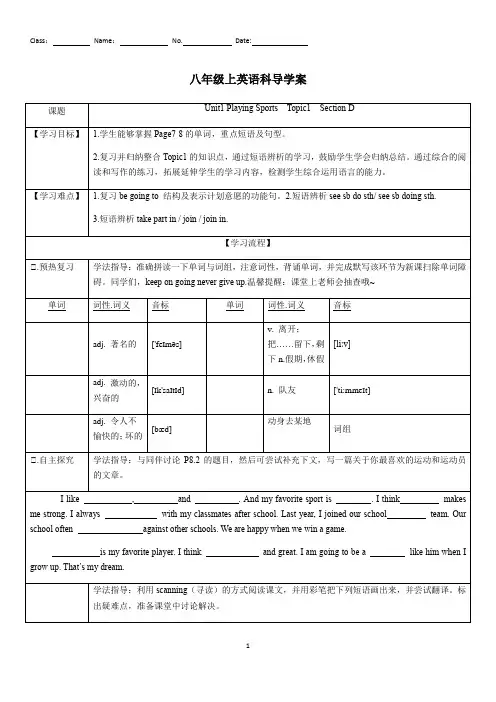
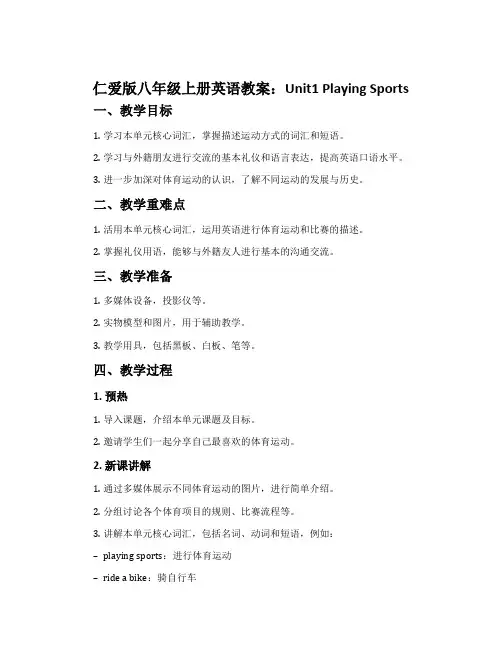
仁爱版八年级上册英语教案:Unit1 Playing Sports一、教学目标1.学习本单元核心词汇,掌握描述运动方式的词汇和短语。
2.学习与外籍朋友进行交流的基本礼仪和语言表达,提高英语口语水平。
3.进一步加深对体育运动的认识,了解不同运动的发展与历史。
二、教学重难点1.活用本单元核心词汇,运用英语进行体育运动和比赛的描述。
2.掌握礼仪用语,能够与外籍友人进行基本的沟通交流。
三、教学准备1.多媒体设备,投影仪等。
2.实物模型和图片,用于辅助教学。
3.教学用具,包括黑板、白板、笔等。
四、教学过程1. 预热1.导入课题,介绍本单元课题及目标。
2.邀请学生们一起分享自己最喜欢的体育运动。
2. 新课讲解1.通过多媒体展示不同体育运动的图片,进行简单介绍。
2.分组讨论各个体育项目的规则、比赛流程等。
3.讲解本单元核心词汇,包括名词、动词和短语,例如:–playing sports:进行体育运动–ride a bike:骑自行车–do yoga:做瑜伽–go swimming:去游泳3. 练习活动1.设计齐头式练习,让学生们发挥创造力,用本单元学习的词汇进行充分表述。
2.利用实物模型和图片进行课堂互动,让学生们用英语表述认出物品,例如:球、拍子、跑步机等。
3.进行小组赛跑组织比赛,并学生之间进行交流。
4. 巩固知识1.汇总单元中学习的常用语句和对话,进行模拟对话演练。
2.分角色进行对话,让学生充分体验面对不同情况时应对的态度和表现。
5. 课堂总结1.对本单元中涉及的核心知识进行总结。
2.讲解下一单元的课题及目标。
五、教学反思本节课设计以体育运动为主题,采用多种教学方式提高学生们的学习兴趣,增加课堂互动。
通过实物模型和图片,让学生们更加直观地了解不同体育运动的设备、规则等,进一步促进他们的学习兴趣。
通过课堂互动和演练,让学生们加深对知识的记忆和理解,同时也积极锻炼其语言口语表达和社交交往能力,提高课程效果。
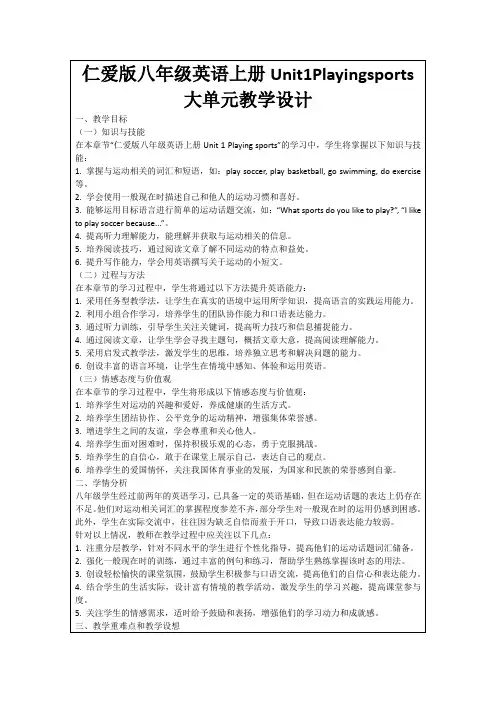
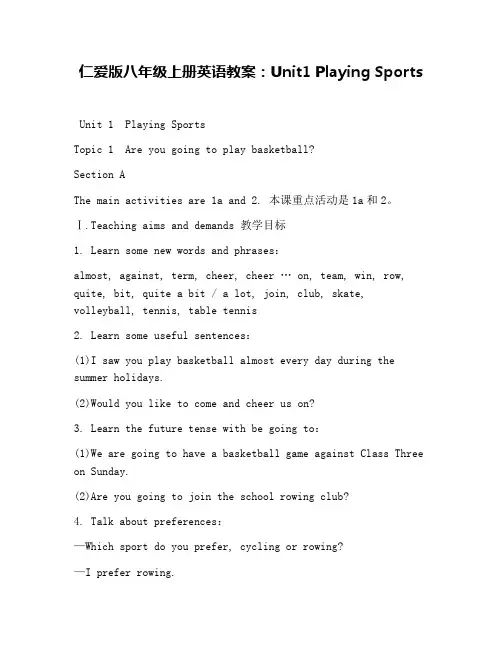
仁爱版八年级上册英语教案:Unit1 Playing SportsUnit 1 Playing SportsTopic 1 Are you going to play basketball?Section AThe main activities are 1a and 2. 本课重点活动是1a和2。
Ⅰ.Teaching aims and demands 教学目标1. Learn some new words and phrases:almost, against, term, cheer, cheer … on, team, win, row, quite, bit, quite a bit / a lot, join, club, skate, volleyball, tennis, table tennis2. Learn some useful sentences:(1)I saw you play basketball almost every day during the summer holidays.(2)Would you like to come and cheer us on?3. Learn the future tense with be going to:(1)We are going to have a basketball game against Class Three on Sunday.(2)Are you going to join the school rowing club?4. Talk about preferences:—Which sport do you prefer, cycling or rowing?—I prefer rowing.5. Talk about sports and games.Ⅱ. Teaching aids 教具图片/海报/教学挂图/录音机/小黑板Ⅲ. Five-finger Teaching Plan 五指教学方案Step 1 Review 第一步复习(时间:7分钟)复习学过的运动项目名称,引出生词。
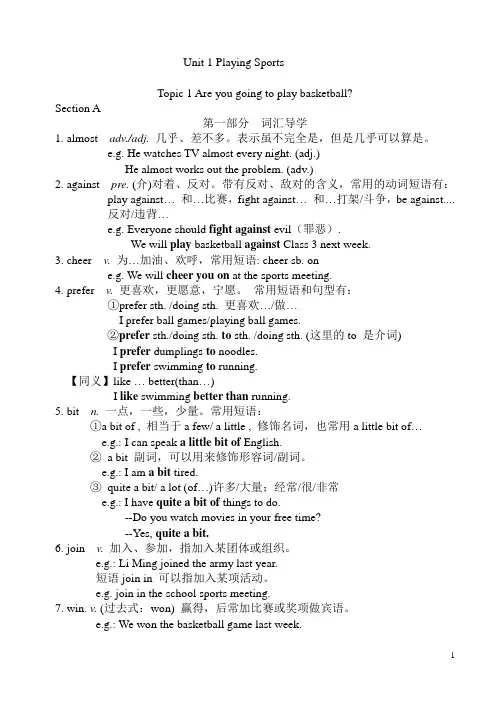
Unit 1 Playing SportsTopic 1 Are you going to play basketball?Section A第一部分词汇导学1. almost adv./adj. 几乎、差不多。
表示虽不完全是,但是几乎可以算是。
e.g. He watches TV almost every night. (adj.)He almost works out the problem. (adv.)2. against pre. (介)对着、反对。
带有反对、敌对的含义,常用的动词短语有:play against…和…比赛,fight against…和…打架/斗争,be against....反对/违背…e.g. Everyone should fight against evil(罪恶).We will play basketball against Class 3 next week.3. cheer v.为…加油、欢呼,常用短语: cheer sb. one.g. We will cheer you on at the sports meeting.4. prefer v. 更喜欢,更愿意,宁愿。
常用短语和句型有:①prefer sth. /doing sth. 更喜欢…/做…I prefer ball games/playing ball games.②prefer sth./doing sth. to sth. /doing sth. (这里的to 是介词)I prefer dumplings to noodles.I prefer swimming to running.【同义】like … better(than…)I like swimming better than running.5. bit n.一点,一些,少量。
常用短语:①a bit of , 相当于a few/ a little , 修饰名词,也常用a little bit of…e.g.: I can speak a little bit of English.②a bit 副词,可以用来修饰形容词/副词。
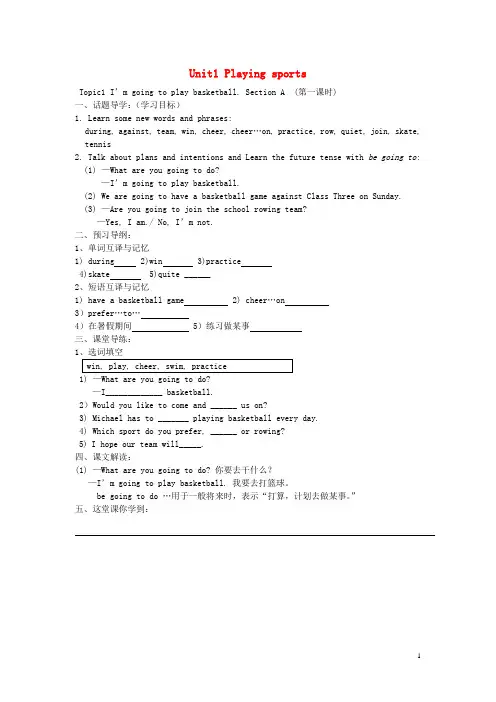
Unit1 Playing sportsTopic1 I’m going to play basketball. Section A (第一课时)一、话题导学:(学习目标)1. Learn some new words and phrases:during, against, team, win, cheer, cheer…on, practice, row, quiet, join, skate, tennis2. Talk about plans and intentions and Learn the future tense with be going to: (1) —What are you going to do?—I’m going to play basketball.(2) We are going to have a basketball game against Class Three on Sunday.(3) —Are you going to join the school rowing team?—Yes, I am./ No, I’m not.二、预习导纲:1、单词互译与记忆1) during 2)win 3)practice4)skate 5)quite ______2、短语互译与记忆1) have a basketball game 2) cheer…on3)prefer…to…4)在暑假期间 5)练习做某事三、课堂导练:1—I_____________ basketball.2)Would you like to come and ______ us on?3) Michael has to _______ playing basketball every day.4) Which sport do you prefer, ______ or rowing?5) I hope our team will_____.四、课文解读:(1) —What are you going to do? 你要去干什么?—I’m going to play basketball. 我要去打篮球。
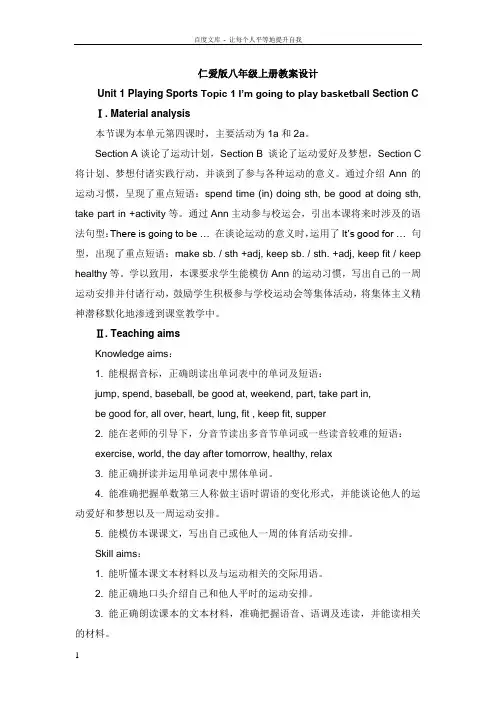
仁爱版八年级上册教案设计Unit 1 Playing Sports Topic 1 I’m going to play basketball Section C Ⅰ. Material analysis本节课为本单元第四课时,主要活动为1a和2a。
Section A谈论了运动计划,Section B 谈论了运动爱好及梦想,Section C 将计划、梦想付诸实践行动,并谈到了参与各种运动的意义。
通过介绍Ann的运动习惯,呈现了重点短语:spend time (in) doing sth, be good at doing sth, take part in +activity等。
通过Ann主动参与校运会,引出本课将来时涉及的语法句型:There is going to be … 在谈论运动的意义时,运用了It’s good for … 句型,出现了重点短语:make sb. / sth +adj, keep sb. / sth. +adj, keep fit / keep healthy等。
学以致用,本课要求学生能模仿Ann的运动习惯,写出自己的一周运动安排并付诸行动,鼓励学生积极参与学校运动会等集体活动,将集体主义精神潜移默化地渗透到课堂教学中。
Ⅱ. Teaching aimsKnowledge aims:1. 能根据音标,正确朗读出单词表中的单词及短语:jump, spend, baseball, be good at, weekend, part, take part in,be good for, all over, heart, lung, fit , keep fit, supper2. 能在老师的引导下,分音节读出多音节单词或一些读音较难的短语:exercise, world, the day after tomorrow, healthy, relax3. 能正确拼读并运用单词表中黑体单词。
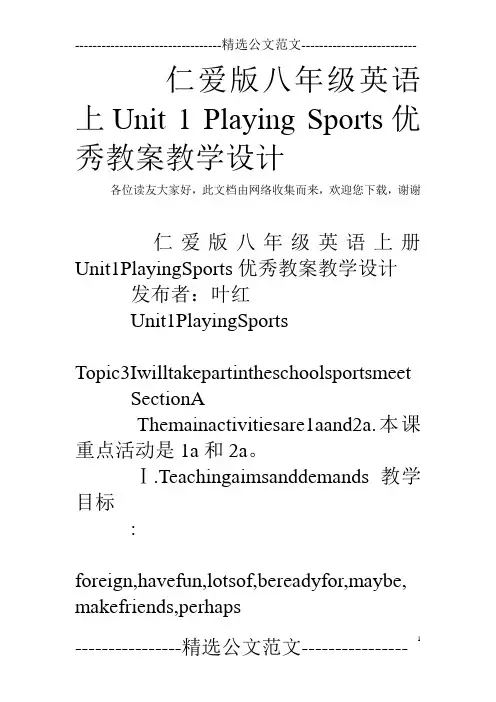
仁爱版八年级英语上Unit 1 Playing Sports优秀教案教学设计各位读友大家好,此文档由网络收集而来,欢迎您下载,谢谢仁爱版八年级英语上册Unit1PlayingSports优秀教案教学设计发布者:叶红Unit1PlayingSportsTopic3Iwilltakepartintheschoolsportsmeet SectionAThemainactivitiesare1aand2a.本课重点活动是1a和2a。
Ⅰ.Teachingaimsanddemands教学目标:foreign,havefun,lotsof,bereadyfor,maybe, makefriends,perhaps:Iwilltakepartintheschoolsportsmeet.whichsportwillyoutakepartin?I’llbeinthelongjumpandthehighjump.I’msureourschoolsportsmeetwillbeexciting.Step1GreetingsT:,howareyoutoday?Ss:I’T:whatdidyoudoduringyourweekend?Didy oudosomesport?Ss:yes.T:whatsportdoyoulike?whichsportdoyoulik ebest?Step2Presentation2.T:?Ss:yes.100-meterrace,relayrace,basketball,thehigh jump,thelongjump…cometothefuturetence“will”sen tencepatter n.T:?Ss:yes.T:whichsportwillyoutakepartin?Ss:Iwilltakepartin…Iwillbein…….Practice PairworkTryitwithyourpartnerandusethefol lowingsentences.A:willyoutakepartintheschoolsportmeet?B:yes,Iwill.A:whichsportwillyoutakepartin?B:Iwilltakepartin…A:Howaboutyou?B:Iwillbein…A:why?B:BecauseIamgoodat…Ienjoy…Read1atogetherandactitout.“Iamareporter”Interviewsomeofyourclassmateswhattheyw illdointheschoolsportmeet.T:?Ss:yes.T:’msureyouwillmakemanyfriendsandhavelot offun)’slookatwhattheplayerswilldointhesportmee t.Readtheinterviewsbyyourselves.Step4ProjectDiscussingroupsandmakeasurvey.willyoutakepartinschoolsportsmeet?whatw illyoudo?why? chooseagroupleadertoreporttheresult.Step5Homework1.仿照1a,与同学讨论在校运会中你将参加哪个项目?并把这个对话写在作业本上。
Unit 1 Playing Sports Topic 1 导学案课型:听说课授课时间:第一周主备人:审核人:一、目标呈现1. 能正确运用be going to do 表达运动计划。
2. 能正确地运用prefer doing结构表达喜好,如:prefer swimming, prefer rowing等。
教学重难点:Key points:能正确、熟练地运用be going to do句型。
Difficult points:1. be going to do句型中的be动词和主语的一致性。
2. see sb. do和see sb. doing的区别。
二.预习热身(A)1.请写出下列单词和短语1.在···期间2.对着,反对3.队,组4.获胜,赢得5.加油,欢呼,喝彩6.为···加油7.练习,实践8.划船9.相当,很,十分10.加入,参加11.溜冰,滑冰12.网球13.play basketball2.在文中勾画出下列短语。
1.What are you going to do?2.see sb. do sth.3.during the summer holidays4.have a basketball game against···5.I hope our team will win.6.prefer doing sth.7.quite a bit/a lot8.join the school rowing team(B)请默写(A)部分1,并将2的短语勾画在书上且翻译。
三、点拨释疑1.What are you going to do?你将要做什么?Eg:I’m going to play basketball with my classmates this Sunday.我打算本周日和同学们一起打篮球。
请试着翻译下面两个句子:She a dress for her mother.她打算为她妈妈买一条裙子。
教师学科教案[ 20 – 20 学年度第__学期]任教学科:_____________任教年级:_____________任教老师:_____________xx市实验学校仁爱版八年级英语导学案Unit1 Playing sportsTopic1 Are you going to play basketball? Section A学习目标:1.掌握Page1—2的单词,重点短语及句型。
2.熟练掌握“be going to +动词原形”的结构表示的一般将来时。
3.积极、主动的参与课堂。
学习重难点:1.一般将来时来时概念:表示将要发生的动作或存在的状态及打算、计划或准备做某事。
基本结构:be going to + do(动词原形);.句中一般有以下时间状语:tomorrow, next day(week, month, year…),soon, the day after tomorrow(后天)等。
否定句:在be动词(am, is, are)后加not;一般疑问句:be提到句首,some改为any, and改为or,第一二人称互换。
例如:I’m going to have a picnic this afternoon.→ I’m not going to have a picnic this afternoon.We are going to go on an outing this weekend.→ Are you going to go on an outing this weekend?2. see sb do sth “看见某人做某事”表示看见事件、行动的全过程,动作已经结束。
see sb doing sth “看见某人正在做某事”强调事件正在进行。
3.have a… game against …“同…进行一场…比赛”4.cheer…on “为某人加油(喝彩)”5.-- Would you like to do sth?-- Sure, I’d love to.6. Me,too.自学引导:1、自学Page1-2的单词。
Unit 1 Playing Sports 第25课时Topic1重点单词 1. prep.在...期间 2. prep.反对,对着 3. n.对,组 4. n.赢,获胜 5. n.加油,欢呼 6. n.足球 7. v.n.练习 8. v.n.划船,一行(排) 9. adv.很,十分 10. v.参加,加入 11. n.滑冰 12. n.网球 13. n.运动员,选手 14. n.v.梦,做梦 15. v.成长,种植 16. n.科学家 17. n.将来 18. n.音乐家 19. n.飞行员 20. n.女警察 21. n.男警察 22. n.邮递员 23. n.渔民 24. v.跳 25. v.花费,度过 26. v.n.锻炼;练习;体操 27. n.棒球 28. n.周末 29. n.部分,片段 30. n.健康 31. adj.流行的受欢迎的 32. n.世界 33. n.心脏 34. adj.健康的 35. adj.健康的 36. v.(使)放松 37. adj.兴奋的激动的 38. adj.著名的 39. adj.坏的 40. v.离开 41. n.遗憾,同情 词汇拓展1.win → _______________(n.)→ ______________(过去式/过去分词)2.football → _______________ (同义词)3.skate → _______________ (现在分词)4.science → _______________ (名词)科学家5.music → ______________ (名词)音乐家6.policeman → ____________ ( pl.)男警察7.postman → ___________ (pl.)邮递员8.fisherman →____________ (pl.)渔民 9.spend →___________ (过去式/过去分词) 10.healthy →__________ (n.)健康 → (同义词)____________ 健康的 11.relax → ____________ (adj.)_放松的 → ____________ (adj.)_令人放松的 12.famous → ____________(名词) 13.leave →__________(过去式/过去分词)短语集锦1.在暑假期间during the summer holidays2.举行一场篮球赛3.have a basketball game (against...)4.为某人加油cheer sb on5.练习做某事 practice doing sth6.更喜欢做某事 prefer doing sth8.去划船 go boating9.参加划船队 join the rowing team 10.加入某人join sb 11.打网球 play tennis 12.为······队效力play for 13.长大grow up 14.在未来,今后in the future 15.半小时half an hour 16.花费···做某事spend...doing sth 17.擅长做某事 be good at = do well in18.参加take part in 19.跳高the high jump 20.跳远 the long jump 21.确信,有把握 be sure 22.让我坚强,使我强壮make me strong 23.对······有益be good for 24.在全世界 all over the world 25.保持健康keep fit/healthy 26.放松自己relax oneself 27.大部分人most people28.后天 the day after tomorrow29.一个保持健康的好方法a good way to keep fit30.到达 arrive at / in31.与…比赛/对抗/较量play against32.呆很久stay for long33.动身去某地leave for34.真遗憾What a shame/pity.35.糟糕的是It ’s a pity that句型集锦1.What are you going to do? 你打算做什么?I ’m going to play basketball. 我打算打篮球。
2.I often saw you play basketball during the summer holidays. 暑假期间我经常看见你打篮球。
3.I hope our team will win. 我希望我们队会赢。
4.Would you like to come and cheer us on? 你愿意来为我们加油吗?Sure,I ’d love to. 当然,我愿意。
5.What sport do you like?= Which sport do you like? 你喜欢哪种运动?Which sport do you prefer?= Which sport do you like better? 你更喜欢哪种运动?I prefer rowing.= I like rowing better. 我更喜欢划船.6.Do you often row?= Do you row much? 你经常划船吗?7.What ’s your favorite sport?= What sport do you like best? 你最喜爱的运动是什么?8.What are you going to be when you grow up? 你长大了想干什么?I ’m going to be a scientist . 我打算成为一个科学家。
9.She play baseball very well and she is good at jumping. 她棒球打得很好而且擅长于跳.10.There is going to be a school sports meet next month. 下个月将会有一次学校运动会。
11.They are sure that she will win. 他们确信她会赢 。
重难点解读★ I often saw you play basketball during the summer holiday.暑假期间我经常看见你打篮球。
(Unit 1 Topic1 P1)1.Nancy is really a hardworking student. We often see her books in the classroom.A.readB.to readC.readsD.reading 2. the Spring Festival, the heavy snow stopped many people from going back home.( )A.AtB.WhenC.AsD.During(1)see sb. do sth. 表示“看见某人做了某事” 强调动作的全过程,常与every day; often 等连用。
如:I often seehim draw pictures near the river. 我常看见她在河边画画.I saw her walk across the street. 我看见她过了马路。
【拓展】see sb. doing sth. 表示 “看见某人正在做某事“强调动作正在进行。
如:I saw her walking across the street. 我看见她正在过马路。
【类似的有watch, hear, feel 等这类感观动词.】(2)during 意为“在...期间”,常与表示时间段的短语或句子连用。
3. ★ Both of them hope their team will win.他们两个都希望他们对赢。
(Unit 1 Topic1 P1) my parents my teachers take good care of me, I love them so much.( )A.Either ;orB.Both; andC.Neither ; norD.Not; until(1)both 意为“两个都”,both 通常放在系动词,助动词和情态动词之后,行为动词之前。
如:His parents are both workers.他的父母都是工人。
They both like playing football.他们两个都喜欢打篮球。
(2)Both可与and构成并列连词,连接两个并列结构。
如:Both he and his brother are good at English.(连接两个并列主语,谓语动词用复数)She can both sing and dance.(并列谓语)Mary are both kind and beautiful.(并列表语)(3)Both和both of 后都可接复数名词。
但both of后的名词前一定要有定冠词,指示代词或物主代词修饰限定。
而both前可有可无。
【注意】含both的句子变为否定句时,是将both改为neither;含both of的句子变否定句时,则变为neither of;含both...and的句子变否定句时,则变为neither...nor...★Michael doesn’t like playing basketball, but he has to practice every day.迈克不喜欢打篮球,但是他不得不每天练习它。
(Unit 1 Topic1 P1)4.We should keep on English every day.( )A.to practicing to speakB.to practice speakingC.paracticing to speakD.practicing speakingpractice意为“练习”,主要用法有:(1)vt.后接名词,动名词做宾语,但不能接不定式。
短语 practice doing sth.意为“练习做某事”,如:They’re practicing the new song.他们正在练习唱那首新歌。
(2)vi. 如:Practice more and you’ll make progress.多练习,你会取得进步的。